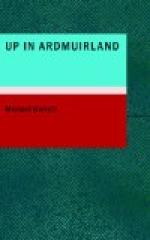I quite agreed with him. To my mind, Robina Lamont was a match for a far more dangerous character. She would be equal in strength to many an able-bodied man. But I felt doubtful whether the arrangement would be satisfactory as regarded the old widow. She was so helpless that unless the man was actually as harmless as was supposed it might he risky to place him in such a house. I voiced my objection, but Val was not impressed by it. He had great confidence in the judgment of the Inspector—a thoroughly able man, and shrewd withal.
When the question was proposed to the Lamonts they at once warmed to the idea. It appeared that one of the lads of their own family—now long dead—had been in much the same state, though he was inclined to be unruly at times; consequently neither the widow nor her daughter felt the least apprehension of difficulties in managing their patient. Thus it came about that Bildy Gow became a member of our community.
In Scotland we have many more diminutive forms of ordinary Christian names than is the case in England. William, for example, figures as Willy, Wildy, Will, Bill, Billy, and Bildy. The variety is useful in cases, which are of frequent occurrence, where the same name belongs to grandfather, father, and son; William, Wildy, and Bill are perfectly distinct. It was as Bildy that William Gow became known among us; before long every one dropped the unnecessary surname and he was spoken of habitually as Bildy simply.
Robina brought her lodger to Mass with her in state on the very first Sunday. He was rather a good-looking fellow, tall and straight, with fresh complexion, regular features and light-brown hair and moustache. He was neatly dressed, too, for he had evidently been fitted out for his new home by the liberality of the Inspector. Beyond a shy, vacant expression, Bildy gave no evidence of mental incapacity in his appearance. He kept close to Robina when they emerged from church, and seemed to rely upon her protection with the air of a shy lad, which was rather pathetic to witness. He was not a Catholic, but he had shown such distress when Robina had told him to sit at home with her mother that they were forced to let him go to church to keep him quiet.
On further acquaintance, Bildy did not belie the good character given him by the Inspector. He was merely a grown-up child. In his youth he must have been of a thoroughly quiet, innocent nature, for he showed it in his aspect still; his character had never developed beyond that innocent adolescence, while his mind had retrograded to a state resembling early childhood. If one spoke to him on the road he at once assumed the air of an exceedingly shy bairn—frightened and embarrassed. It would have been amusing were it not so sad. I could never extract a word from him on such occasions, so overawed was he!
From the first, while looking upon Robina as the supreme authority to which he owed implicit obedience, Bildy seemed to give all his affection to the old widow. He liked nothing better than to sit opposite her by the fireside, watching the tireless swiftness of her knitting needles as they flashed in the firelight. When summoned by Robina for any duty, he would promptly comply, returning as soon as free to his favorite attraction.




